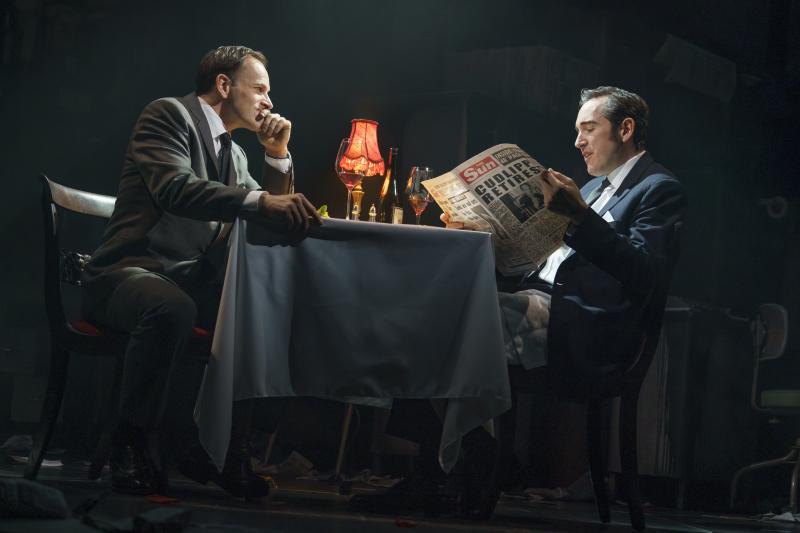Review: James Graham's Wildly Raucous INK Chronicles Rupert Murdoch's Rise To Tabloid Journalism Infamy
|
Long before the term clickbait entered into pop culture infamy, Chief Editor Larry Lamb of the Fleet Street tabloid The Sun was offering his staff a bonus every time the eye-catching words "Win," "Free" and "Love" appeared on the front page.

(Photo: Joan Marcus)
At least that's the way it's dramatized by playwright James Graham in his wildly raucous snapshot of young Rupert Murdoch's rise to purple journalism power, Ink.
Bertie Carvel repeats his Olivier-awarded performance as the Australian mogul-to-be in director Rupert Goold's tense and slickly-paced production that originated at London's Almeida Theatre and transferred to the West End. He and co-star Jonny Lee Miller, playing the exploitative editor, lead a terrific ensemble of 18 actors, popping in and out of multiple roles as projection designer Jon Driscoll splashes headlines above them.
"Once you know why something happened, the story's over, it's dead," Lamb explains to Murdoch as the two gentlemen feel each other out in the play's opening scene, set in the middle of London's mod era, 1969. The seasoned newspaperman prefers to focus on the four other W-questions that form the basis of journalism: who, what, when and where.
"Don't answer why, a story can run and run, can run forever."
This is good news for the bottom-line focused Murdoch, who recently purchased the failing Sun and tempts Lamb with a juicy offer after his failure to advance at Britain's best selling paper, The Mirror; to place him in charge with the goal to outsell the stodgy symbol of ethical reporting within a year.
"You were the best sub on the street," pushes Murdoch as he starts reeling in his catch. "Did your time at The Mirror and after a decade it began to dawn on you they would never let you sit in the pilot's seat. Not you. Not Larry Lamb, the Yorkshire born son of a blacksmith, not the guy who didn't get a degree from Oxford or Cambridge, who didn't get a degree from anywhere. Not you."
Like Sweeney Todd before him, Lamb sees the opportunity to make Fleet Street, London's hub of print journalism, the place where he gets his revenge.
The first act takes the audience through the basics of daily newspaper journalism in London and how Lamb intends to send a shock to the system with bold-print headlines and stories focus on sex, violence, scandal and gossip.
"Giving normal folk the ammunition to laugh at their so-called betters," is how he explains it. "We punch up, never down. That should be our... values. If that's not too strong a word."

Tara Summers, Eden Marryshow, Andrew Durand
and Jonny Lee Miller (Photo: Joan Marcus)
At first Mirror chairman Hugh Cudlipp (traditionally distinguished Michael Siberry) is more amused than threatened by his upstart competition, as sales figures confirm his paper's dominance. But gradually, The Sun's unconventional methods, such as (gasp!) advertising on television, begin to pay off. (A very amusing scene has Welsh actor Christopher Timothy, played by Andrew Durand, being instructed to record voiceover copy at lightening speed to cram as many ear-catching headlines as possible into a 20-second spot.)
The second act involves two major events that, for better or worse, drove up sales. The first is the kidnapping of Muriel McKay (Tara Summers), wife of Press Editor Alick McKay (Colin McPhillamy), by ransom-seekers who had intended to abduct Murdoch's wife. Being an exclusive story, it was handled with the sensational style the paper had established, despite the personal tragedy being so close to home.
The second is the decision to regular publish cheesecake photos of topless models, an idea that is approached with make-or-break seriousness. Though projections show that the first "Page 3 Girl," Stephanie Rahn, was white, the production uses non-traditional casting by having Rana Roy, an actor of multi-cultural descent, play the role, which she does with moving sensitivity.
In keeping with Lamb's philosophy, the fast-moving, highly engaging Ink never stops to consider why the public came to devour The Sun's outlandish style of journalism. Like it or not, we all know the why.
Add Your Comment
Videos
